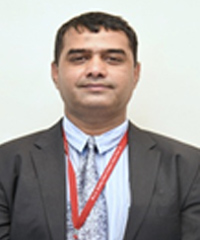
Prof. Dr. Anita Frantz
Principal & IQAC Chairperson
Role of IQAC in College Development
As Chairperson of the Internal Quality Assurance Cell (IQAC), I take pride in the pivotal role that IQAC has played in driving continuous improvement and fostering excellence in academics, administration, and infrastructure development. IQAC ensures our curriculum is industry-aligned, empowers faculty through training, nurtures holistic student development, and promotes research and innovation.
By bridging stakeholders—students, faculty, parents, alumni, and industry—the IQAC integrates their feedback to enhance institutional quality. It also ensures compliance with accreditation standards, data-driven decision-making, and sustainable growth.
Let us work together to make our institution a model of innovation and inclusivity.

Asso. Prof. Imran Sayyed
IQAC Coordinator
Role of IQAC in College Development
The Internal Quality Assurance Cell (IQAC) plays a vital role in enhancing and sustaining quality in colleges. IQAC facilitates self-evaluation, accreditation, and stakeholder participation for holistic institutional development and it employs planned and strategic interventions to address deficiencies and improve institutional performance. Much like “Quality Circles” in industries, it fosters a culture of continuous improvement and excellence across all aspects of the institution.
Objectives of IQAC:
- Enhance Academic Standards: Develop and implement strategies for quality enhancement in teaching, learning, and research activities.
- Promote Best Practices: Encourage adoption of innovative and effective practices in academic and administrative functions.
- Ensure Stakeholder Engagement: Facilitate active participation of students, faculty, and external stakeholders in the quality assurance process.
- Facilitate Accreditation Processes: Prepare the institution for external quality assessments and accreditations by national and international agencies.
- Strengthen Internal Processes: Establish systematic approaches for regular assessment and improvement of institutional performance.
- Support Professional Development: Organize workshops, training programs, and seminars for faculty and staff to enhance their skills.
- Foster Research and Innovation: Promote a culture of research, innovation, and knowledge dissemination across departments.
- Monitor Continuous Improvement: Establish mechanisms for periodic review and upgradation of policies, programs, and infrastructure.
Roles and Functions of IQAC:
- Quality Assurance: Ensure consistent improvement in academic and administrative processes.
- Curriculum Enhancement: Facilitate updates to curricula to meet industry and societal needs.
- Faculty Development: Organize training programs and workshops for faculty growth.
- Student Support: Enhance student services, including counseling, skill development, and placements.
- Feedback Mechanism: Collect and analyze feedback from students, faculty, and stakeholders for improvement.
- Research Promotion: Encourage research activities and innovation across disciplines.
- Documentation: Maintain records of quality initiatives and institutional progress.
- Accreditation Support: Assist in preparing for accreditation and compliance with standards.
- Infrastructure Development: Recommend upgrades to facilities and learning resources.
- Internal Audits: Conduct periodic academic and administrative audits to ensure quality benchmarks.
Benefits:
IQAC will facilitate / contribute to:
- Ensure clarity and focus on institutional functioning towards quality enhancement.
- Ensure internalization of the quality culture.
- Ensure enhancement and coordination among various activities of the institution and
- institutionalize all good practices.
- Provide a sound basis for decision-making to improve institutional functioning.
- Guidelines of IQAC and submission of AQAR for Autonomous Colleges Page 9
- Act as a dynamic system for quality changes in HEIs.
- Build an organized methodology of documentation and internal communication.
Composition of IQAC
| The composition of IQAC | ||
| Sr.No | Name of Member | Designation |
| 1 | Prof.Dr. Anita Frantz (Principal, M. A. Rangoonwala Institute of Hotel Management & Research, Pune. ) | Chairperson |
| 2 | Asst. Prof. Imran Sayyed (Academic Coordinator, M. A. Rangoonwala Institute of Hotel Management & Research. Pune. ) | Secretary |
| 3 | Mr. Amit Kumar Sharma (Cluster General Manager (Maharashtra) at The Fern Hotels & Resorts Pune.) | Industry Representative |
| 4 | Prof. Irfan Shaikh (Secretary, M.C.E. Society, Pune) | Management Representative |
| 5 | Mr. Riyaz Shaikh (Tophkhana Young Circle Trust, Pune) | NGO Member |
| 6 | Asst.Prof Neeraj Joshi (Asst, Prof , M. A. Rangoonwala Institute of Hotel Management & Research, Pune) | Member |
| 7 | Asst.Prof Girish Kate (Asst, Prof , M. A. Rangoonwala Institute of Hotel Management & Research, Pune) | Member |
| 8 | Asst. Prof. Aruna Tompe (Asst, Prof , M. A. Rangoonwala Institute of Hotel Management & Research, Pune) | Training &Placement Coordinator |
| 9 | Mr. Samdani Shaikh (F & B Associate E-Square The Fern Pune) | Alumni Representative |
| 10 | Mr. Imran Pathan (Admin Clerk, M. A. Rangoonwala Institute of Hotel Management & Research, Pune) | Administrative Member |
| 11 | Ms. Kshitija Kalamkar T.Y.B.Sc.(HS) (President Students Council) | Student Member |
| 12 | Mr. Darshan Kotain T.Y.B.Sc.(HS) (Member Students Council) | Student Member |
IQAC is constituted in our institution under the Chairmanship of the Head of the institution with heads of important academic and administrative units and a few teachers and a few distinguished educationists and representatives of local management and stakeholders.

